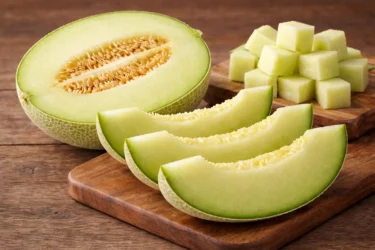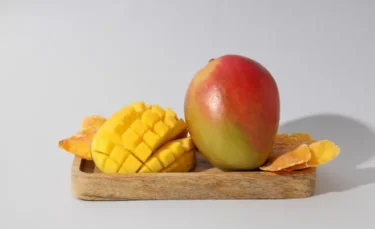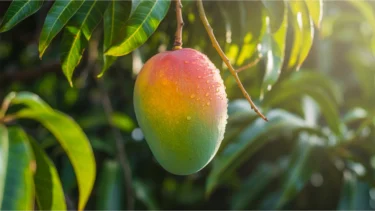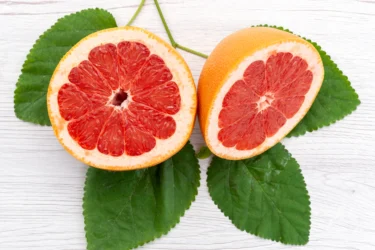The mandarin orange species of the family Rutaceae includes the small, thin-skinned form of orange known as the tangerine (Citrus reticulata). Tangerine culture originated in Southeast Asia and travelled west through trade routes all the way to the Mediterranean1. The fruit is grown in both the Old World and the New World’s subtropical regions, mainly southern Europe and the southern United States. The pulp is soft, juicy and flavorful with plenty of vitamin C. Many flavourings and liqueurs use the oil derived from the tangerine’s fragrant skin as a distinctive ingredient.
A medium-sized tangerine with a diameter of around 2/12 inches weighs roughly 88 gm and contains the following2:
Tangerines provide the following health advantages:
Tangerines are a great source of dietary fibre for people and are packed with vitamin C.

Tangerines and their peels are abundant in flavonoids and vitamin C, two antioxidants that guard against a wide range of ailments3. By counteracting the harmful effects of oxidative stress, which is brought on by the buildup of free radicals, antioxidants defend your body against damage. These hazardous compounds contribute to the emergence of chronic diseases like cancer, arthritis and heart disease.
Tangerine is one of the citrus fruits like oranges, lemons, and grapefruits. Much like other members of its family, it is high in vitamin C. Vitamin C is a powerful antioxidant and might be beneficial for eye health. Thus, including citrus fruits in your diet regularly is highly recommended6.
Dr. Siddharth Gupta, B.A.M.S, M.D (Ayu)

Tangerine excellent status as a food high in antioxidants is one of the best things about tangerine fruit. Antioxidants are potent substances that work to counteract the harm done to the body by free radicals, lowering the risk of inflammation and chronic diseases like cancer, diabetes and heart disease. According to research4, tangerines are a great source of naringin, naringenin, nobiletin, narirutin and hesperidin, as well as other antioxidant components. Moreover, tangerines contain a lot of vitamin C, a water-soluble vitamin that functions as an antioxidant to shield cells from oxidative damage.

According to experts, persons with type 2 diabetes may benefit from the antioxidants found in citrus fruits like tangerines. Researchers of a study5 noted in a publication that people with type 2 diabetes have decreased levels of antioxidant vitamins and enzymes. Patients with type 2 diabetes and other inflammatory disorders may experience less oxidative stress by consuming antioxidant-rich fruits like tangerines or fruit extracts.

The high vitamin C concentration of tangerines, which delivers more than 25% of your daily needs in just one fruit, is responsible for the majority of your health advantages. In addition to aiding in the absorption of iron and warding off infections, vitamin C is a strong antioxidant that protects your cells from stress-related cellular damage and ageing.
Based on some studies7, Tangerine might aid in the improvement of sleep quality, mood enhancement and cognitive functions.
Dr. Rajeev Singh, BAMS
Tangerines is a juicy fruit with tremendous health benefits. They can be used as
Tangerines can be combined with chocolate and walnuts for a refreshing take on summer cakes. They are delicious and can be eaten as a dessert on sultry summer afternoons. Tangerines can also be coated or dipped in melted chocolate to make a sweet snack for kids. Tangerines also go really well with caramels, marshmallows and other sweet ingredients. Meat products like spiced ham can be marinated using the tangerine sauce for a juicy and refreshing flavour.
Also Read: 15 Amazing Benefits of Poppy Seeds (Khus Khus)
Despite the fact that tangerines are extremely healthy and advantageous, it is advisable to consume them in moderation. Tangerines have reportedly caused allergy reactions in some people under specific circumstances. Hence, inform your healthcare practitioner right away if you develop any of these side effects or any adverse responses after eating tangerines.
Also Read: Custard Apple: Uses, Benefits, Side Effects and More!
Abdominal pains and diarrhoea are two gastrointestinal problems that may result from overeating tangerines. They might also conflict with liver-related drugs. Despite being nutritious, eating more tangerines than advised could be harmful to your health. Before consuming tangerines, check with your doctor if you are taking medicine for your liver.
Also Read: Kulthi Dal: Uses, Benefits, Side Effects & More!
Oranges and tangerines are both fruits that belong to the citrus family. However, they are not the same. While oranges might provide more vitamin C and fibre per serving, tangerines seem to be a richer source of vitamin A. Although tangerines tend to be more reddish-orange than most orange varieties, they share a similar hue. Compared to tangerines, oranges are bigger and rounder. Either kind may have seeds or not. Tangerines are more reddish-orange than most orange kinds, which are typically yellowish-orange.
Tangerines have few calories and no fat, but they are a great source of fibre, vitamins and minerals. An average-sized tangerine has 50 calories and 13 grams of carbohydrates, 9 grams of which are natural sugars. Just under 50% of your daily vitamin C needs and approximately 10% of your daily fibre requirements are provided by one tangerine.
Tangerines have high levels of vitamin C, a powerful antioxidant that fights free radical damage and reduces inflammation. Tangerines allow your body to absorb iron from your diet. They can aid in the healing of small wounds and cuts. Pectin and hemicellulose, two fibres found in tangerines, limit the absorption of cholesterol in the intestine and reduce the risk of obesity. Tangerines’ fibre helps with constipation and enhances digestion. Vitamin A, which is abundant in tangerines and aids in tissue repair, may also lessen the appearance of age-related signs of ageing such as fine lines, wrinkles and dull skin.
In ancient native China and Japan, mandarins have been grown for more than three thousand years. They were given that name because orange-robed Chinese aristocrats wore them. The fruit was first transported to Europe and the Americas in the 1800s through Tangiers in Morocco, hence the name of the fruit.
Tangerines and oranges come in a variety of flavours, although each fruit’s flavour is mostly influenced by its type. Oranges and tangerines both come in sweet and sour varieties. The majority of tangerines, however, are sweeter and less tart than oranges. Additionally, tangerines typically have a shorter aftertaste and a more robust flavour profile than oranges.
1. Mabberley DJ. Citrus (Rutaceae): a review of recent advances in etymology, systematics and medical applications. Blumea. 2004;49(2‑3):481–498. doi:10.3767/000651904X484432. Available from: https://www.researchgate.net/publication/233545464_Citrus_Rutaceae_A_Review_of_Recent_Advances_in_Etymology_Systematics_and_Medical_Applications
2. U.S. Food and Drug Administration. Raw Fruits Poster — Fruits Nutrition Facts (Raw, Edible Weight Portion). Raw Fruits Poster (Text Version / Accessible Version) [Internet]. [cited 2025 Dec 04]. Available from: https://www.fda.gov/food/nutrition-food-labeling-and-critical-foods/raw-fruits-poster-text-version-accessible-version
3. Shi M, Guo Q, Xiao Z, Sarengaowa, Xiao Y, Feng K. Recent Advances in the Health Benefits and Application of Tangerine Peel (Citri Reticulatae Pericarpium): A Review. Foods. 2024 Jun 23;13(13):1978. doi: 10.3390/foods13131978. PMID: 38998484; PMCID: PMC11241192. Available from: https://pmc.ncbi.nlm.nih.gov/articles/PMC11241192/
4. Alam MA, Subhan N, Rahman MM, Uddin SJ, Reza HM, Sarker SD. Effect of citrus flavonoids, naringin and naringenin, on metabolic syndrome and their mechanisms of action. Adv Nutr. 2014 Jul 14;5(4):404-17. doi: 10.3945/an.113.005603. PMID: 25022990; PMCID: PMC4085189. Available from: https://pmc.ncbi.nlm.nih.gov/articles/PMC4085189/
5. Visvanathan R, Williamson G. Effect of citrus fruit and juice consumption on risk of developing type 2 diabetes: Evidence on polyphenols from epidemiological and intervention studies. Trends in Food Science & Technology. 2021;115:133‑146. doi:10.1016/j.tifs.2021.06.038. Available from: https://www.sciencedirect.com/science/article/pii/S092422442100412X
6. American Academy of Ophthalmology. Four Fantastic Foods to Keep Your Eyes Healthy. AAO Eye Health News [Internet]. 2012 May 03 [cited 2025 Dec 04]. Available from: https://www.aao.org/eye-health/news/four-fantastic-foods
7. Chandharakool S, Koomhin P, Sinlapasorn J, Suanjan S, Phungsai J, Suttipromma N, Songsamoe S, Matan N, Sattayakhom A. Effects of Tangerine Essential Oil on Brain Waves, Moods, and Sleep Onset Latency. Molecules. 2020 Oct 21;25(20):4865. doi: 10.3390/molecules25204865. PMID: 33096890; PMCID: PMC7587980. Available from: https://pmc.ncbi.nlm.nih.gov/articles/PMC7587980/
Disclaimer: The information provided here is for educational/awareness purposes only and is not intended to be a substitute for medical treatment by a healthcare professional and should not be relied upon to diagnose or treat any medical condition. The reader should consult a registered medical practitioner to determine the appropriateness of the information and before consuming any medication. PharmEasy does not provide any guarantee or warranty (express or implied) regarding the accuracy, adequacy, completeness, legality, reliability or usefulness of the information; and disclaims any liability arising thereof.
Links and product recommendations in the information provided here are advertisements of third-party products available on the website. PharmEasy does not make any representation on the accuracy or suitability of such products/services. Advertisements do not influence the editorial decisions or content. The information in this blog is subject to change without notice. The authors and administrators reserve the right to modify, add, or remove content without notification. It is your responsibility to review this disclaimer regularly for any changes.
Cantaloupe is a summer-time, pulpy fruit which is also known as muskmelon or rock melon. These fruits have a hard outer skin, belong to the Cucurbitaceous family and are related to various other melons, squashes and cucumbers1. Cantaloupes of different varieties are grown all over the world; having a mild and sweet flavour with many important health benefits. In this article, you shall learn more about the health benefits of cantaloupe, its nutritional profile and potential side effects.
Cantaloupe has rich nutritional value comprising Vitamins A, B and C and minerals like sodium, magnesium and potassium. When considering cantaloupe calories, it’s worth noting that this fruit provides a tasty and low-calorie option for those seeking a nutritious addition to their diet. The fruit has zero cholesterol1 and listed below is the cantaloupe nutrition value per 1 cup of cantaloupe:
Did you know?
Due to its rich nutrient profile, Cantaloupe has several properties that can lead to a wide array of health benefits.
Cantaloupe or muskmelon is one of the fruits with high water content. Due to its high-water content, cantaloupe might be quite useful in regaining water loss while sweating after vigorous physical activity19.
Dr. Siddharth Gupta, B.A.M.S M.D (Ayu)
Cantaloupe is a tasty fruit, packed with nutrients. It is easily available and can potentially be beneficial for health when consumed in your routine diet.

Cantaloupe is rich in antioxidants and may help eliminate inflammation in the body. They fight off free radicals that are responsible for causing oxidative stress and cell damage, this helps lower the risk of developing serious health issues like diabetes, heart disease, arthritis and more. Cantaloupe has anti-inflammatory properties and can help relieve pain/discomfort in your joints and bones3,4.
While natural remedies can be helpful as adjunct, if you notice any symptoms of inflammation in the body, consult the doctor immediately for a timely diagnosis and treatment of the ailment.

Cantaloupes have vital nutrients to keep your heart healthy. Some initial studies7 have shown that melon extracts can help regulate heart beat and blood pressure by modulating nitrous-oxide mediated blood vessel contraction. They are rich in potassium which can also contribute to keeping the blood pressure in check8. Cantaloupes may also show some blood-thinning properties which are good for the heart. Plus, their fibre content helps to decrease “bad cholesterol” levels9.

Cantaloupe benefits the skin as it is loaded with vitamin A and vitamin C, these essential nutrients help in improving skin health. Vitamin A helps protect the skin from sun damage and vitamin C supports natural collagen production. Cantaloupe has high water content and keeps your skin healthy, imparting a youthful glow to your skin. It may help keep wrinkles at bay by maintaining skin elasticity, thus providing anti-ageing benefits. It can also help reduce the risk of UV induced damage to the skin, lower pigmentation and help with skin repair and regeneration10.

Cantaloupe fruit is a melon and is rich in beta carotenes which help in maintaining healthy vision. When absorbed by the body, these beta carotenes are converted into Vitamin A and are highly beneficial for the eyes. They help improve vision and play a role in lowing the risk of conditions like age-related macular degeneration and cataracts11,12. However, remember to always get your eyes checked by the doctor if you have vision problems.

Cantaloupe is beneficial for hair as it contains vitamins A and C, which play crucial roles in supporting overall hair health. Vitamin A aids in maintaining a healthy scalp, while vitamin C supports collagen production, contributing to hair strength. The hydrating properties of cantaloupe may help prevent dryness and promote a well-moisturised scalp. While more research is needed for conclusive evidence, incorporating cantaloupe into your diet as part of a nutrient-rich regimen could potentially benefit your hair13,14. Always consult with a healthcare or hair care professional for personalized advice.

Cantaloupe is said to offer significant health benefits during pregnancy. Rich in vitamins A, C and folate, it supports foetal development and boosts the immune system, crucial for the well-being of both the mother and baby15,16. The high-water content aids in hydration3, addressing a common concern during pregnancy. Additionally, cantaloupe’s natural sweetness provides a healthy alternative to satisfy pregnancy cravings. However, pregnant individuals should seek advice from healthcare professionals for personalised guidance on incorporating anything new in diet, including cantaloupes, to ensure optimal health for both mother and baby.
While initial studies have shown potential health benefits of cantaloupe, further large-scale human trials are needed to confirm these findings. Nonetheless, cantaloupe holds promising value as a delicious and nutrient-packed home remedy that can be great for your skin, hair and overall health.
Cantaloupes are delicious and can be used in many ways, including:
Cantaloupes are available throughout the year and you must consume them within 3 days of purchase for the freshest taste17. Adding cantaloupe to your daily diet will help you get all the nutrients required for the proper functioning of your body. Cantaloupes are loaded with vitamins, minerals and antioxidants, they are eaten by children and adults3.
However, before incorporating anything new into your routine diet, it is necessary to speak with a certified doctor, especially if you have a medical condition like diabetes or are on any medications. You must never discontinue or replace any ongoing medicine with an Ayurveda/herbal supplement without consulting a certified doctor.
Cantaloupe or muskmelon is a rich source of various nutrients like carbohydrates, proteins, vitamins, minerals, etc. As it is rich in various phytochemicals, it may exhibit anti-inflammatory and antioxidant properties that might be beneficial in various inflammatory diseases20.
Dr. Rajeev Singh, BAMS
In this section, let’s see how cantaloupe and muskmelon differ.


Cantaloupe is generally considered to be safe for consumption. Rarely only does it cause any allergy or side effects. However, you must avoid overconsumption of cantaloupe as it contains potassium and eating too much of it can harm your kidneys. Having too much potassium in your blood may also increase the risk of a heart attack18. Similarly, eating excess cantaloupe may not be good for your intestines and may cause diarrhoea, stomach cramps and other digestive problems. You must inform the doctor about any specific health problem before consuming cantaloupe. And also remember to not overdo the consumption for its benefits.
Also Read: Sonth: Uses, Benefits and Side effects by Dr. Smita Barode
You must avoid eating cantaloupe if it is unripe, keep it aside for a few more days and eat after it ripens. Always clean the cantaloupe properly before eating so that it has no harmful bacteria on it.
If you have any medical condition or are on any medication, you must consult your doctor before including cantaloupes in your routine diet. For instance:
If you suffer from an inflammatory condition of the gut or if you have undergone bowel surgery, you should monitor your fibre intake closely.
People with type 2 diabetes should also have this fruit with caution and consult the doctor to know the right serving size of cantaloupe for them.
Cantaloupe is a nutrient-dense “superfood” that supports almost everything from hydration and eye health to foetal development during pregnancy. While its high antioxidant and vitamin content promotes general wellness, moderation in consumption is key. Individuals with any medical concerns should always discuss with their doctor before regular consumption. Ultimately, when enjoyed as part of a balanced diet, this muskmelon can prove to be an effective and delicious health-booster.
Also Read: Khirni Fruit: Uses, Benefits and Side Effects by Dr. Smita Barode
Yes, eating cantaloupe every day will optimise its health benefits. However, it is advised to consult the doctor and discuss the benefits and risks of having cantaloupe every day. The health condition may vary from person to person, so you must know how much cantaloupe you should eat daily.
Yes, you may eat the seeds of a cantaloupe fruit. The crunchy seeds can be eaten raw or roasted, they must be dried and then you can roast them with salt, pepper and other seasonings. The seeds can also be added to blended drinks for more nutrition.
Cantaloupes can be stored as whole fruit or sliced. You can keep a cantaloupe in the fridge. To freeze cantaloupe best, you must wait until they are fully ripe. Once frozen, you may store the fruit in an airtight container in the freezer for up to three months.
Yes, cantaloupes are known for being especially easy to digest. They are mostly made up almost entirely of water and do not cause indigestion or any discomfort.
Cantaloupe is not typically considered keto-friendly as it contains a moderate amount of carbohydrates, which may impact ketosis. It’s advisable to consult with a healthcare professional or nutritionist for personalized advice on incorporating fruits into a ketogenic diet.
Cantaloupe can support weight loss due to its low-calorie and high-water content, promoting satiety. It’s essential to consult with a healthcare professional or nutritionist for personalized advice and to ensure it aligns with an individual’s overall dietary and health needs.
Cantaloupe contains natural sugars, but it is relatively low in overall sugar content compared to some other fruits. Individuals managing diabetes or concerned about sugar intake should consult with a healthcare professional to determine appropriate serving sizes and consider their overall dietary plan.
Yes, cut cantaloupe should be refrigerated to maintain its freshness and prevent bacterial growth. Store it in an airtight container or covered with plastic wrap to extend its shelf life.
Cantaloupe is generally well-tolerated, but some individuals may experience gas or bloating after consuming it due to its fibre content. If persistent issues arise, it’s advisable to consult a healthcare professional for personalized advice on dietary adjustments and potential underlying digestive concerns.
Yes, cantaloupe can be a good choice for diabetics as it is low in calories, rich in vitamins, and has a moderate glycaemic index, which means it has a gradual impact on blood sugar levels when consumed in moderation. However, individuals with diabetes should monitor their portion sizes and consult with a healthcare professional for personalized dietary advice.
Disclaimer: The information provided here is for educational/awareness purposes only and is not intended to be a substitute for medical treatment by a healthcare professional and should not be relied upon to diagnose or treat any medical condition. The reader should consult a registered medical practitioner to determine the appropriateness of the information and before consuming any medication. PharmEasy does not provide any guarantee or warranty (express or implied) regarding the accuracy, adequacy, completeness, legality, reliability or usefulness of the information; and disclaims any liability arising thereof.
Links and product recommendations in the information provided here are advertisements of third-party products available on the website. PharmEasy does not make any representation on the accuracy or suitability of such products/services. Advertisements do not influence the editorial decisions or content. The information in this blog is subject to change without notice. The authors and administrators reserve the right to modify, add, or remove content without notification. It is your responsibility to review this disclaimer regularly for any changes.
Nothing feels more satisfying than tasting a batch of fresh grapes! These are not only important for curating a quality wine but are also used in refreshing fruit bowls and dishing out sinful desserts. It is because of this versatility, that grapes are also called as “Queen of fruits”. The scientific name of grapes is Vitis vinifera and it belongs to the family Vitaceae. Grapes are crunchy and juicy shots of heaven in various colours like black, green and red. They can be with or without seeds. About 8000 years ago, the cultivation of grapes began in the Middle East. They are now widely grown in Africa, Southern Europe, North and South America and Australia, India ranks among the top ten countries in the production of grapes. In India, 80% production is done in Maharashtra, Karnataka and Tamil Nadu. They are not only tasty but have several health benefits. Let us read about some evidence-based benefits which will tempt you to add grapes to your diet1,2.
Did you know?
Grapes are richly packed with various nutritional components that are given as follows3:
Grapes show numerous scientifically proven properties and some of these properties are mentioned below4:
Some of the potential benefits of grapes are described as follows:

Studies support the association of grapes with an improvement in cognitive function. Grapes contain antioxidants like resveratrol which have anti-inflammatory and antioxidant properties which may help inhibit neurodegeneration. It also increases blood flow to the brain, and along with the presence of minerals like manganese, potassium and calcium, may improve brain health. Lee et al. conducted a study5 in 2017 to assess the effect of grape consumption on cognitive function. The study was conducted on ten participants with mild cognitive decline; this study showed a positive effect of grapes on cognitive function. Thus, grapes may have a positive impact on cognitive function. However, more studies are needed to support these claims.

Literature reviews suggest that grapes contain phytochemical resveratrol, which may have hepatoprotective effects against cholestatic, chemical and alcohol-mediated damage. Asim et al. conducted a study6 in 2022 to assess the effect of the consumption of grapes on non-alcoholic fatty liver disease in mice. This study showed that grapes helped modulate hepatic gene expression, preventing oxidative damage and ameliorating NAFLD. This indicates that the consumption of grapes may help manage NAFLD. Additionally, resveratrol may help reduce liver fibrosis and steatosis, which are features of chronic liver disease and thus, may exert a hepato-protective effect. However, scientific evidence to support these claims is limited, and we need more studies to support these claims.

Polyphenol-rich food may have a favourable effect on lipid profile. Roberta et al. conducted a meta-analysis in 2020 to assess the impact of grapes on lipid profile7. This meta-analysis showed that grapes’ consumption significantly reduced low-density lipoprotein (LDL) or bad cholesterol and increased high-density lipoprotein (HDL) or good cholesterol. This reduction in LDL cholesterol is attributed to the presence of polyphenols like resveratrol in grapes. Therefore, the consumption of grapes may help in reducing bad cholesterol and increasing good cholesterol. However, we need more scientific evidence to support these claims.
Did you know that adding grapes to your diet can be a secret weapon for youthful aging? These amazing fruits are packed with antioxidants that work their magic inside your cells, fighting off harmful oxidative stress and kickstarting the production of a powerful antioxidant called glutathione10.
Dr. Rajeev Singh, BAMS

Type II diabetes mellitus is a global public health challenge affecting the majority of the population. It is characterized by an increased glucose production by the liver due to insulin resistance and beta-cell defects. Grapes have a low glycemic index, which may positively impact type II diabetes mellitus. Zunino et al. conducted a literature review in 2009 to assess the effect of grapes on type II diabetes8. The review suggested that grapes may have the potential to reduce elevated blood glucose, improve beta cell function and protect against beta cell loss due to the presence of numerous polyphenols like resveratrol, catechins, anthocyanins, etc. The results of this study indicate that grapes may exert a positive impact on type II diabetes. Additionally, the presence of resveratrol may help in managing diabetic neuropathy. However, we need more research to support these claims.

Several literature studies support the use of grapes as promising anticancer agents due to the presence of antioxidants. Zhou et al. conducted an in-vitro study9 in 2012 to assess the effect of grapefruit on small lung cancers. The results of this study supported the use of grapes for managing cancer. The anti-cancerous activity is attributed to the presence of antioxidants like proanthocyanidins which show inhibitory effects on several cancers. So, it might be possible that grapes can help in dealing with cancer. However, this finding needs further research to be applied practically.

Though there are studies that show the benefits of grapes in various conditions, these are insufficient and there is a need for further studies to establish the true extent of the benefits of Grapes on human health.
Including grapes in your diet might have a positive impact on retinal health. The antioxidants present in grapes may help protect and preserve the structure and function of the photoreceptors in the retina, promoting better vision and avoiding further damage11.
Dr. Siddharth Gupta, B.A.M.S, M.D (Ayu)
You can incorporate grapes into your dietary routine in the form of fresh, frozen or as juice2.
You must consult a qualified doctor before including grapes in your diet. Do not discontinue or replace an ongoing treatment of modern medicine with grapes without consulting a qualified doctor.
Data regarding the side effects of grapes is limited and more research is required to verify the side effects of grapes on human health. However, if you experience any adverse reactions to grapes, it is advised to discontinue its intake and immediately contact a doctor or your Ayurvedic physician who has prescribed it. They will be able to guide you appropriately for your symptoms.
Also Read: Grapefruit (Chakotra): Uses, Benefits, Side Effects and More!
Eating grapes is okay if taken in moderate amounts. However, general precautions must be followed in the following conditions:
Also Read: Durian: Uses, Benefits, Side Effects By Dr. Rajeev Singh
Grapes (Angur) are known to interact with several drugs resulting in untoward effects. Drugs known to interact adversely with grapes are mentioned below; given with them are the conditions wherein they are advised.
These interactions can result in unwanted effects on the body and may reduce the drug’s efficacy. However, you must always seek the advice of your Ayurvedic physician about the possible interaction of grapes with other drugs and follow the prescription thoroughly, as they will know your health condition and other medications you are taking.
Also Read: Buffalo Milk: Uses, Benefits, Side Effects By Dr. Rajeev Singh
The scientific name of grapes is Vitis vinifera1.
Grapes are known as “queen of fruits”1.
Yes, grapes may help manage diabetes as they have a low glycemic index. However, more studies need to be done to support these claims in humans. Therefore, it is advised to consult a doctor for proper treatment.
The presence of melatonin in grapes may help manage insomnia. The scientific evidence supporting these claims is limited and therefore, it is advised to consult a doctor if you have any sleep-related issues.
Data regarding the side effect profile of grapes is limited, and more research is required to verify the side effects of grapes on human health. However, if you experience any adverse reactions to grapes, it is advised to discontinue its intake and immediately contact a doctor or your Ayurvedic physician who has prescribed it. They will be able to guide you appropriately considering your symptoms.
Disclaimer: The information provided here is for educational/awareness purposes only and is not intended to be a substitute for medical treatment by a healthcare professional and should not be relied upon to diagnose or treat any medical condition. The reader should consult a registered medical practitioner to determine the appropriateness of the information and before consuming any medication. PharmEasy does not provide any guarantee or warranty (express or implied) regarding the accuracy, adequacy, completeness, legality, reliability or usefulness of the information; and disclaims any liability arising thereof.
Links and product recommendations in the information provided here are advertisements of third-party products available on the website. PharmEasy does not make any representation on the accuracy or suitability of such products/services. Advertisements do not influence the editorial decisions or content. The information in this blog is subject to change without notice. The authors and administrators reserve the right to modify, add, or remove content without notification. It is your responsibility to review this disclaimer regularly for any changes.
Mangoes and summer seasons are a match made in heaven! The sweet and juicy taste coupled with countless health benefits justify why mango is called the “king of fruits”. Mangifera indica, mango or aam, is an important fruit in Ayurveda. It belongs to the genus Mangifera, and family Anacardiaceae which contains 30 different species. India ranks first among the major mango-producing countries. India is famous for its wide range of mango varieties, like Alphonso variety of Ratnagiri, Badami variety of Karnataka, Dasheri variety of Lucknow and Kesar variety of Gujarat to name a few. Mangoes are good for our taste buds and our health. They are also a rich source of fibre, vitamins, minerals and antioxidants like mangiferin and glucosyl xanthone. Let us read more about some mango benefits1.
Mango (Aam) is packed with various nutritional components that are given as follows. They are a good source of vitamins, minerals and antioxidants like mangiferin and glucosyl xanthone, and carotenes.
In my opinion, eating mangoes might be a way of giving your body a natural defence against certain diseases. Mangoes might have superpowers against certain types of cancers. Yes, it’s true! Thanks to the magical combination of beta-carotene and other special substances, mangoes might help against leukaemia and even slow down the progression of prostate and colon cancers11.
Dr. Siddharth Gupta, B.A.M.S, M.D (Ayu)
The mango shows numerous scientifically proven properties; some of these properties are mentioned below:
Some of the potential benefits of mango are described as follows:

Breast cancer is one of the most common cancers, leading to pre-mature death of females globally. Natural products are now becoming important sources for the discovery of anti-cancer agents. Mangifera indica may have the potential for the management of breast cancers. Banerjee et al. conducted a study in 2015 to assess the effect of mangoes on breast cancer xenografts in mice. This study3 showed that polyphenols like gallic acid, galloyl glycosides and gallotannins in mangoes might have a chemotherapeutic potential against breast cancer. This indicates that mangoes may help in managing breast cancer. However, more studies are required to support these claims.

Ulcerative colitis is a chronic inflammatory condition affecting the colon and rectum. Mangoes may help in reducing inflammation because of the presence of polyphenols like gallotannins and gallic acid. Kim et al. conducted a study4 in 2016 to assess mango’s anti-inflammatory effects in a preclinical colitis model. The results of this study4 showed that mango consumption might help in managing ulcerative colitis. However, more human studies are required to ascertain these claims.
From my perspective, eating mangoes can be a tasty solution to help with constipation. In a study12, it was found that munching on mangoes might actually improve the symptoms of constipation. Thus, mangoes may be a delicious way to keep things flowing smoothly in your digestive system.
Dr. Smita Barode, B.A.M.S, M.S.

Fruits and vegetables are a rich source of bioactive compounds which may help in managing the blood glucose level. The study conducted by Evans et al. 2014 showed that mangoes may reduce blood glucose levels in both females and males. The mango contains tocopherols, carotenoids, dietary fibre, ascorbic acid, gallic acid, quercetin and mangiferin. These biologically active compounds may help in normalising blood glucose levels. However, to claim all these benefits further research and confirmation are needed. If you suspect high blood glucose levels, consult your doctor and do not self-medicate5.

Mangoes, if consumed in moderate amounts, may help achieve healthy hair and nourished skin due to its high Vitamin A content. Additionally, mangoes may act as a natural sunblock by protecting our skin and hair from damage caused due to ultraviolet rays. Therefore, there is a possibility that the consumption of mango can benefit skin and hair, but we need more human studies6 to support these claims. If you have any skin and hair related problems, consult a doctor and do not self-medicate.

Macular degeneration is a common eye disorder which causes vision loss. Mangoes are rich in antioxidants like lutein, zeaxanthin and Vitamin A, which may help deal with macular degeneration. Mango is also rich in carotene which may help in vision. Thus, it may indicate that consuming mango may help manage macular degeneration. However, there is a lack of studies6 to support these claims.

Mangoes are a good source of nutrients in the diet. The nutrient intake of mango consumers vs. non-consumers was obtained from the NHANES database. It was observed that people who consumed mangoes had a higher intake of magnesium, potassium, folate, Vitamin A, C and E and dietary fibre compared to the non-consumers. This may indicate that the consumption of mangoes can help improve nutrient intake and diet quality. However, more studies7 need to be conducted to support these claims.

Though there are studies that show the benefits of Mango in various conditions, these are insufficient and there is a need for further studies to establish the true extent of the benefits of Mango on human health.
Let me tell you a secret. Mangoes are not just delicious; they’re also packed with a special ingredient called mangiferin! This fancy-sounding compound can be found in various parts of the mango fruit, like the peel, stalks, leaves, barks, kernel, and even the stone. Mangiferin might be just the secret weapon as it is high in antioxidants13.
Dr. Rajeev Singh, BAMS
This super versatile fruit can be used in the following ways:
You must consult a qualified doctor before taking any herbal supplements or mangoes in large quantities. Do not discontinue or replace an ongoing treatment of modern medicine with an ayurvedic/herbal preparation without consulting a qualified doctor.
Also Read: Jackfruit (Kathal): Uses, Benefits, Side Effects and More!
A few side effects related to the consumption of mango include:
However, if you experience any adverse reactions to mango, it is advised to discontinue its intake and immediately contact a doctor or your Ayurvedic physician who has prescribed it to you. They will be able to guide you appropriately for your symptoms.
Eating mango is beneficial if taken in moderate amounts. However, general precautions must be followed in the given conditions:
Also Read: Water Apple: Uses, Benefits, Side Effects, And More!
Mangoes inhibit the cytochrome P450 enzymes, which are known to metabolize certain drugs like warfarin, propranolol, theophylline, etc. Inhibition of these enzymes can alter the blood concentration of drugs metabolized by this pathway. Therefore, you must always seek the advice of your Ayurvedic physician about the possible interaction of raw mangoes with other drugs and follow the prescription thoroughly, as they will know your health condition and other medications you are taking10.
The scientific name of mango is Mangifera Indica and it belongs to the family Anacardiaceae1.
Animal cell line studies support the use of mangoes for managing breast cancers. However, more studies are needed to claim these effects. Thus, it is recommended to consult a doctor for proper treatment3.
Mango is also known as the “king of fruits”1.
Yes. As mango is a rich source of Vitamin A, it may improve vision. However, it is advised to consult a doctor for proper diagnosis for vision-related problems and not consider the consumption of mango as an alternative to modern medicine6.
Consumption of mangoes in excess can cause short-term gastrointestinal disorders like stomach pain and diarrhoea and allergies in allergy-prone individuals10.
Disclaimer: The information provided here is for educational/awareness purposes only and is not intended to be a substitute for medical treatment by a healthcare professional and should not be relied upon to diagnose or treat any medical condition. The reader should consult a registered medical practitioner to determine the appropriateness of the information and before consuming any medication. PharmEasy does not provide any guarantee or warranty (express or implied) regarding the accuracy, adequacy, completeness, legality, reliability or usefulness of the information; and disclaims any liability arising thereof.
Links and product recommendations in the information provided here are advertisements of third-party products available on the website. PharmEasy does not make any representation on the accuracy or suitability of such products/services. Advertisements do not influence the editorial decisions or content. The information in this blog is subject to change without notice. The authors and administrators reserve the right to modify, add, or remove content without notification. It is your responsibility to review this disclaimer regularly for any changes.
“Kacchi kairi” or raw mango is reminiscent of our childhood days for many of us. The name itself is sufficient to stimulate our taste buds. The scientific name of mango is “Mangifera indica”, and it belongs to the family Anacardiaceae. Be it the tangy kacchi kairi (raw mango) or the sweet ripened fruit, mangoes are one of the most relished fruits in India.
There are over 30 different species of mango, each with a unique taste, colour, size, and shape. Every part of the mango tree has some medicinal properties. For example:
Various parts of the tree have also been used as antiseptic, dentifrice (tooth powders and toothpaste), diaphoretic (to increase perspiration), and vermifuge (anti-helminthic).
The taste and numerous health benefits justify why mango is called the “King of Fruits.” Let’s find out more about this nutrient-rich fruit.
Raw mango is a great source of nutrients, rich in vitamins, minerals, dietary fiber, and carotenoids. Here are the nutritional components of raw mango per 100 grams2:
Did you know?
Research has found that the consumption of raw mangoes may show the following properties:
Some of the potential benefits of raw mango are described as follows:
Raw mango is high in fiber and low in calorie content and can help manage weight. Yanni et al. conducted a study5 in 2022 to assess the effect of mango consumption on weight-related health outcomes. It was found that the male adults who consumed raw mangoes showed a lower Body Mass Index (BMI), waist circumference and body weight compared to the non-consumers. This may indicate that the consumption of raw mangoes may help in weight management. However, more studies to support these claims are needed3,4.
Raw mango is rich in antioxidants like polyphenols and mangiferin. A review6 conducted in 2017 stated that mangiferin helps inhibit cell proliferation and apoptosis (cell death). It is known to interfere with cell cycle regulation and thus, the carcinogenic pathway. This may indicate that raw mangoes can help in managing cancers. However, human studies are required to ascertain these claims.
Raw mangoes may help in avoiding liver problems by stimulating bile production. Bile is a juice produced by the liver that helps break down fats and aids digestion. It helps in the removal of drugs and toxins from the body. Additionally, mangiferin, an antioxidant in raw mangoes, has a hepatoprotective function. This may indicate that consuming raw mangoes may help improve the liver’s health. However, no human studies have been conducted so far to support these claims3,5.
Raw mangoes contain a unique antioxidant, mangiferin, which helps balance triglycerides, cholesterol, and fatty acids. Additionally, the fibre, potassium, and vitamin content in mangoes may help reduce the risk of cardiac diseases. Therefore, there is a possibility that the consumption of mangoes can help promote a healthy heart, but we need more human studies to support these claims3.
Due to the presence of nutrients like Vitamin A, Vitamin C, Vitamin E, proteins, iron, zinc, etc., raw mangoes are a good option for nourished hair and healthy skin. Furthermore, vitamin C is important for forming collagen, which strengthens the hair and skin. In addition, raw mangoes may help improve hair growth and produce sebum, which is known to moisturise the scalp and keep the hair healthy. This indicates that the consumption of raw mangoes may exert a beneficial effect on hair and skin. However, there needs to be more studies to support these claims in humans3.
Raw mangoes are rich in Vitamin C, which may help reduce the risk of various blood disorders like haemophilia, anaemia, and blood clot formation. Additionally, raw mangoes may help increase the elasticity of blood vessels and aid the hematopoiesis process (formation of new blood cells). This indicates that consuming raw mangoes may help manage blood disorders. However, as the scientific evidence supporting these claims is limited, it is best to seek a professional opinion if you might be suffering from a blood disease3.
Though there are studies that show the benefits of raw mangoes in various conditions, these are insufficient and there is a need for further studies to establish the true extent of the benefits of raw mangoes on human health.
Did you know that one cup (165-gram) of sliced, raw mango contains approximately 100 calories? Mangoes are not only delicious but also provide a satisfying and nutrient-rich snack option5.
Dr. Siddharth Gupta, B.A.M.S, M.D (Ayu)
Raw mangoes can be used in the following ways:
You must consult a qualified doctor before taking any herbal supplements. Do not discontinue or replace an ongoing treatment of modern medicine with an ayurvedic/herbal preparation without consulting a qualified doctor.
Individuals with a latex allergy should exercise caution when consuming mangoes, as they may experience a cross-reaction. This means that the proteins in mangoes can trigger an allergic response in those who are sensitive to latex7.
Dr. Rajeev Singh, BAMS
A few side effects related to the consumption of raw mango include:
However, if you experience any adverse reactions to raw mango, discontinue its intake and immediately contact a doctor or your Ayurvedic physician who has prescribed it to you. They will be able to guide you appropriately for your symptoms.
Also Read: Red Rice: Uses, Benefits, Side Effects & More
Eating raw mango is okay if it is taken in moderate amounts. However, general precautions must be followed while consuming raw mango. The majority of the precautions are:
Also Read: Bakuchi: Uses, Benefits, Dosage & Side Effects
Raw mangoes inhibit the cytochrome P450 enzymes, which are known to metabolise certain drugs like warfarin, propranolol, theophylline, etc. Inhibition of these enzymes can alter the blood concentration of drugs metabolised by this pathway. Therefore, you must always seek the advice of your doctor about the possible interaction of raw mangoes with other drugs, and follow the prescription thoroughly, as they will know your health condition and other medications you are taking.
Also Read: Peanuts: Uses, Benefits, Side Effects and More
The scientific name of mango is “Mangifera indica”, and it belongs to the family Anacardiaceae1.
Mango is known as the king of fruits1.
Raw mangoes contain a high level of carotenoids, which may help improve eyesight. However, there are no human studies which have proven these claims. So, it is advised to consult a doctor for proper treatment.
Consumption of raw mangoes in excess can result in stomach pain and diarrhoea. Some people may experience allergies or throat pain after consumption of certain raw mango varieties.
Since raw mangoes can inhibit the cytochrome P450 enzymes, medicines which are metabolised by this pathway may show an unwanted reaction. So, it is advised to consult a doctor for proper advice.
Disclaimer: The information provided here is for educational/awareness purposes only and is not intended to be a substitute for medical treatment by a healthcare professional and should not be relied upon to diagnose or treat any medical condition. The reader should consult a registered medical practitioner to determine the appropriateness of the information and before consuming any medication. PharmEasy does not provide any guarantee or warranty (express or implied) regarding the accuracy, adequacy, completeness, legality, reliability or usefulness of the information; and disclaims any liability arising thereof.
Singhara is one fruit that may not be your favorite, but you still see it in your house on multiple occasions. Along with the arrival of the winter season, this fruit starts to make a place in our houses and hearts! Some people use dried and powdered seeds as flour, while many like to consume them raw. The powder is also used in fasting meals.
So, if you are curious about the properties and benefits of eating singhara, you have come to the right place! Singhara in English is called water chestnuts and are fruits grown in ponds. Singhara are scientifically known as Trapa natans, belonging to the Lythraceae family. Some common names of this fruit are singhara or simkhata in Hindi, karimbolam or vankottakkaya in Malayalam, and water chestnuts in English1. Singhara is a commonly used fruit in India. In addition, Singhara has been cultivated commercially by countries like India, China, Korea, Japan, and North America2. Singhara has good nutritional value along with many beneficial properties.
The nutritional value of singhara per 100g of serving is given below.
The many properties of Singhara are given below.
Because of its good nutritional value and properties, Singhara may show potential use against many health conditions. However, more studies and research needed to consolidate the effectiveness of singhara in these conditions. That’s why you must consult your healthcare provider and get a proper diagnosis. Some of the potential uses of singhara are given below.

Involving optimal fibre in your diet can help you manage weight. Foods with high fibre content provide bulk, keeping you full for longer. High fibre is also known to delay the absorption of sugars and foods. All these benefits may contribute to healthy body weight5. However, if you want to reduce or manage weight, consult with a qualified dietician before making any significant changes to your diet.

A good amount of fibre might help keep the digestive system healthy. Singhara has plenty of fibre that enables you to meet daily requirements. In addition, having plenty of fibre is linked to a reduced risk of diseases like constipation and irritable bowel syndrome (IBS)5. It might also help maintain a good bowel movement. However, avoid eating singhara to cure or eliminate any digestive problems. If you have any digestive issues, you need to talk to your healthcare provider and get treated.
Based on my observations, water chestnuts or singhara have shown potential anti-ulcer properties. They may help restore the balance in the stomach by reducing acid-pepsin secretion and promoting mucus secretion, which can contribute to the management of stomach ulcers6.
Dr. Rajeev Singh, BAMS

Eating high fiber might help reduce the absorption of glucose from the stomach. This may help maintain blood glucose levels and help avoid surges in blood glucose. So, adding singhara to your diet might help manage the glucose levels in the blood5. However, if you have diabetes, you should adhere to the doctor’s advice and avoid using fruits or herbs on your own.

A high content of cholesterol in the blood can cause heart problems. This cholesterol can accumulate in the blood vessels and increase the risk of heart attacks. The high fibre content of singhara might help you lower your blood cholesterol and reduce the risk of heart problems5. However, more studies will be required to support the use of singhara for heart health. Therefore, in case of heart problems, reach out to your healthcare provider.

Singhara has plenty of gallic acids. Gallic acid is an effective anti-inflammatory agent, which may help reduce inflammation and swelling. This activity of singhara might help with inflammatory skin diseases. As per a study2 conducted by Kim et al. (2015), the singhara extract could reduce the skin damage caused by sodium lauryl sulphate (SLS), a popular ingredient in soaps and other products. However, more research and studies are required to support the use of singhara for skin problems. Therefore, if you are struggling with skin problems, talk to your skin doctor or dermatologist.
Though studies show the water chestnut benefits in various conditions, these are insufficient. More studies are needed to establish the true extent of the benefits of herbs on human health.
Based on my experience, I have observed that water chestnuts contain high levels of flavonoids, flavones, and phenols, which may constitue to their antioxidant properties. These antioxidants play a crucial role in protecting our cells from oxidative damage caused by harmful free radicals. Consuming water chestnuts may contribute to overall health and well-being6.
Dr. Siddharth Gupta, B.A.M.S, M.D (Ayu)
Singhara or water chestnut seeds are edible. However, make sure to peel the skin before use.
You must consult a qualified doctor before taking singhara or other herbal supplements. Do not discontinue or replace an ongoing treatment of modern medicine with an ayurvedic/herbal preparation without consulting a qualified doctor.
I recommend chestnut flour as a suitable option for patients with celiac disease. Chestnut flour is gluten-free, which means it does not contain the proteins that can trigger a reaction in individuals with celiac disease. Additionally, chestnut flour offers other health benefits, such as being a good source of fiber and nutrients, making it a valuable choice for those following a gluten-free diet6.
Dr. Smita Barode, B.A.M.S, M.S.
Because of its high fiber content, overeating water chestnuts might give you stomach problems. A sudden increase in dietary fibre may cause stomach pain and gas. Therefore, stick to moderate amounts and avoid overeating.
Also, before you use singhara for its effects against any condition, talk to your healthcare provider about the possible side effects associated with its use.
Also Read: Talmakhana: Uses, Benefits and Side Effects by Dr. Smita Barode
Before taking singhara for its health benefits, consult with a physician about the possible precautions associated with the use of singhara. It will help you make good choices about your health.
Also Read: Red Chilli: Uses, Benefits, Side Effects By Dr. Smita Barode
There is a lack of information on the interactions of singhara with other drugs and medicines. Therefore, consult your healthcare provider about possible medicine interactions if you are receiving treatment for any health condition.
Also Read: Apricot (Khubani): Uses, Benefits & Side Effects
Singhara might be helpful in weight management and digestion. Singhara may also be used against diseases like diabetes and skin and heart problems2,5. However, more research is required to support the use of singhara for its health benefits. Therefore if you are suffering from health issues, consult your healthcare provider and receive proper treatment.
Singhara is a rich source of fibre. Involving sufficient fibre in your diet might help you manage weight by giving a sense of fullness for a longer period. Fibre may also help reduce the absorption of glucose from the intestine5. All these factors combined may help you lower your food intake and help manage weight. However, talk to a dietician or healthcare provider if you want to lose or manage weight. They will be able to better guide you about each diet’s risks and benefits.
Eat singhara only after consulting with your doctor. Pregnant women should consult their healthcare provider before making any changes to their diet.
Singhara is high in fibre content. Suddenly increasing your fibre content excessively may give you stomach problems like abdominal pain and gas. Therefore, you should eat singhara in moderate amounts5. Also, before using Singhara for its health benefits, talk to your healthcare provider about the possible side effects associated with its use.
There are many ways to consume singhara. You can consume them raw (after peeling) or cooked. The powder of singhara seed kernel is often used as a flour substitute in cooking1. However, if you want to use singhara for its medicinal benefits, make sure you talk to a healthcare provider first before using any herbal remedy.
Disclaimer: The information provided here is for educational/awareness purposes only and is not intended to be a substitute for medical treatment by a healthcare professional and should not be relied upon to diagnose or treat any medical condition. The reader should consult a registered medical practitioner to determine the appropriateness of the information and before consuming any medication. PharmEasy does not provide any guarantee or warranty (express or implied) regarding the accuracy, adequacy, completeness, legality, reliability or usefulness of the information; and disclaims any liability arising thereof.
Links and product recommendations in the information provided here are advertisements of third-party products available on the website. PharmEasy does not make any representation on the accuracy or suitability of such products/services. Advertisements do not influence the editorial decisions or content. The information in this blog is subject to change without notice. The authors and administrators reserve the right to modify, add, or remove content without notification. It is your responsibility to review this disclaimer regularly for any changes.
Pomelo is a natural citrus fruit and highly nutritious and resembles grapefruit, but the size of pomelo is large. Pomelo has its origin in subtropical, tropical southeast Asia and is the most widely cultivated fruit crop in the world1,2. The scientific name of pomelo is Citrus grandis (L) which belongs to the Rutaceae family. Pomelo is also referred to as Pummelo, Chinese grapefruit, and Shaddock fruit2,3. The taste of pomelo is slightly acidic and sweet with a hint of bitterness, which makes it one of the five most consumed citrus fruit around the world. The data released by the Food and Agriculture Organization of the United Nation in 2019, stated that worldwide Pomelo production is around 9.3 million metric tons and the USA is the leading producer with approximately 5 million metric tons3.The important nutritional constituents like vitamin C, para insulin, folic acid, potassium, pectin, and chromium4. The composition of the fruit can vary with the conditions like fruit size, maturity, horticulture conditions, climate, and storage3. Let us discuss more beneficial properties of the Pomelo.
Did you know?
The nutrient value of pomelo is:
Nutritional value of pomelo per 100 grams5
You will feel fuller for a longer period because of the protein and fibre in pomelo. This may bring down your cravings, which eventually leads to calorie reduction through portion control. Pomelo has a low-calorie count per serving as well. I strongly recommend foods like pomelo that may help you boost your nutrition while lowering your calorie intake if you’re attempting to lose weight11.
Dr. Siddharth Gupta, B.A.M.S, M.D (Ayu)
The properties of Pomelo are given as follows:
From my perspective, consuming pomelos might be good for your heart by lowering your blood’s triglyceride and cholesterol levels. In one research, rats who were fed concentrated pomelo extract had lower triglyceride levels (by up to 21%) and LDL (or “bad”) cholesterol levels (by up to 41%). Pomelo may lower dangerous lipids in circulation by inhibiting their absorption during digestion, according to different researches11.
Dr. Rajeev Singh, BAMS
Pomelo may be a rich source of nutrients and some of the potential uses of Pomelo are:

Pomelo contains flavonoids like quercetin, hesperetin and naringin. The flavonoids in the pomelo may bind to starch leading to an increase in hepatic glycolysis (breakdown of glucose) and a decrease in gluconeogenesis (glucose formation). The study7 by Lin et al. 2021 showed that ethanolic extract of pomelo may reduce hyperglycemia by upregulating the insulin concentration. If you have diabetes consult your doctor and do not self-medicate7.

The collagenase and elastase enzymes are responsible for the breakdown of collagen, resulting in skin aging. The free radicals present in the body may increase the production of collagenase and elastase. An increase in the production of these enzymes can accelerate skin aging. The antioxidant property of pomelo may help in managing skin aging by scavenging free radicals. The study8 by Lukitaningsih et al. 2021, evaluated the physical and chemical stability parameters of the pomelo extract in the semisolid formulation and pomelo may show the free radical scavenging property. This may help in the anti-collagenase and anti-elastase activity of the pomelo extract8, If you have skin-related problems consult your doctor and do not self-medicate.

Pomelo peel extract may benefit the agriculture industry. Pomelo may be used to inhibit microbes that cause disease in the plant. Staphylococcus aureus is one such microbe that can contaminate food (fresh or packed). To control the contamination of food, Sawanit aichayawanich9 2013, produced a biodegradable film containing pomelo peel extract to inhibit Staphylococcus aureus. The essential oil in the pomelo peel extract may destroy the phospholipids layer of the microbe leading to leakage of cytoplasm and may also inhibit the essential enzyme of Staphylococcus aureus9.

Pomelo may contain volatile oils that have the aroma of citrus which play an important role in the insecticidal, fragrance, and repellent properties. Terpenoids like Linalool, Neorl, geraniol, nootkatone, indole, and cadinene are important aromatic compounds that may be potential for flavor, cosmetic, insecticidal, repellent and fragrance industries. These compounds reach the maximum concentration level at maturation providing maximum benefits3.
Though studies show the benefits of Pomelo in various conditions, these are insufficient, and there is a need for further studies to establish the true extent of the benefits of Pomelo on human health.
Our cells are harmed by free radicals, especially if our surroundings are full of them. Antioxidants may aid in repairing that damage, lowering our chance of developing cancer. From my knowledge, Pomelos are well-known for containing significant amounts of vitamin C, a potent antioxidant, as well as other antioxidant chemicals such as naringenin and naringin, which are also frequently present in citrus fruits, and lycopene, commonly found in tomatoes11.
Dr. Smita Barode, BAMS, MS
Pomelo or Chinese grapefruit can be used in the following ways:
One should always consult an Ayurvedic physician before consuming pomelo in large quantities or for therapeutic benefits. They will be the best person to prescribe you the correct form and dosage as per your health condition.
Pomelo being a fruit does not have any side effects. However, children and elders should take precautions and consult an ayurvedic physician in case they are on medication, before consuming pomelo. Pharmacists and health professionals should create awareness among people and educate them about the potential side effects of the drug with fruit juices.
Also Read: Matki (moth beans): Uses, Benefits, Side Effects, and More By Dr. Smita Barode
Also Read: Kabab Chini: Uses, Benefits and Side Effects by Dr. Smita Barode
Consuming pomelo juice with sildenafil (which belongs to the phosphodiesterase5 medicine group) may reduce the bioavailability of sildenafil. The bioavailability of Cyclosporine may increase with the intake of pomelo juice. The increase in the blood level of tacrolimus is also reported after the consumption of 100gm of pomelo10. You should consult doctors or ayurvedic physicians before taking fruit juice with drugs.
Also Read: Eggs: Uses, Benefits, Side Effects By Dr. Smita Barode
Pomelo may help in anti-aging of the skin, decrease blood glucose levels, and reduce diabetes. However, more research is to be conducted to claim these effects of pomelo. If you have any of the mentioned problems consult your doctor and do not self-medicate.
Yes, pomelo may interact with some drugs like cyclosporine, sildenafil, and tacrolimus.
Adults and children especially those on medication should avoid fruit juices. Still, more research should be conducted on pomelo juice. Pomelo fruit or juice must be taken only after the doctor’s advice.
The flavonoids present in pomelo fruit may decrease the formation of glucose and increase the breakdown of glucose which may help in managing diabetes. If you have diabetes consult your doctor and do not self-medicate.
The antioxidant property of pomelo may help in scavenging the free radicals that are responsible for the increase in the production of enzymes that cause skin aging. The scavenging will decrease the production of these enzymes, thus delaying the aging process.
Disclaimer: The information provided here is for educational/awareness purposes only and is not intended to be a substitute for medical treatment by a healthcare professional and should not be relied upon to diagnose or treat any medical condition. The reader should consult a registered medical practitioner to determine the appropriateness of the information and before consuming any medication. PharmEasy does not provide any guarantee or warranty (express or implied) regarding the accuracy, adequacy, completeness, legality, reliability or usefulness of the information; and disclaims any liability arising thereof.
Links and product recommendations in the information provided here are advertisements of third-party products available on the website. PharmEasy does not make any representation on the accuracy or suitability of such products/services. Advertisements do not influence the editorial decisions or content. The information in this blog is subject to change without notice. The authors and administrators reserve the right to modify, add, or remove content without notification. It is your responsibility to review this disclaimer regularly for any changes.